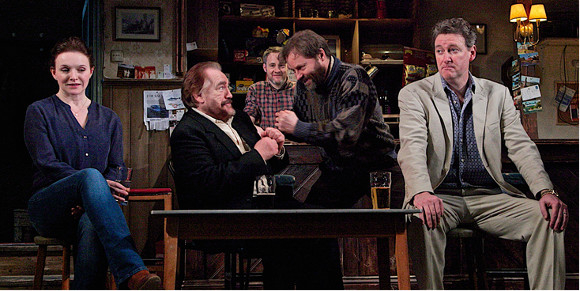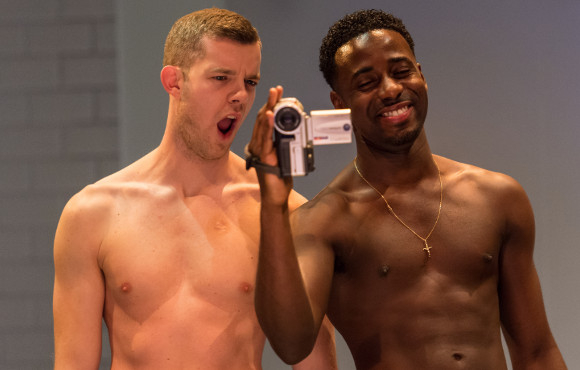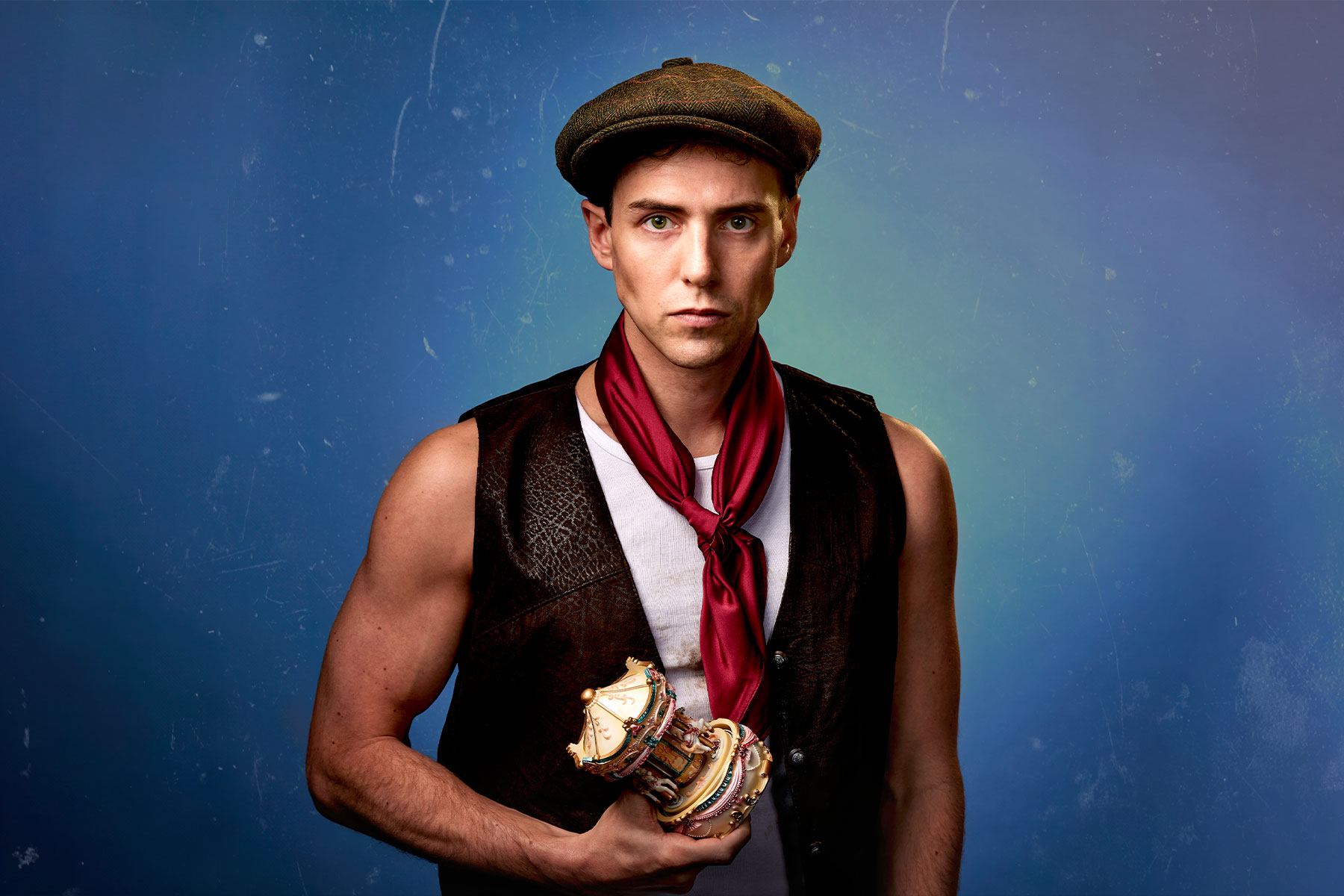Michael Coveney: Cheers to The Weir, and to footie fans of The Pass

© Francis Loney
Every time I see The Weir, a most extraordinary hush descends on the audience, as if somehow the soft breath of Conor McPherson's haunting play is passing over their collective grave. No exception to this last night at Wyndham's, where Josie Rourke's Donmar Warehouse revival of last April moved at last into the West End.
Marking the event, an audience of celebrity Weir-does was suitably hushed. I sat behind Carey Mulligan and her mum, in front of Andrew Marr and his wife, and fairly near Fiona Shaw, A A Gill (nattily bow-tied, as usual, and accompanied by Nick Allott, again as usual), Jemima Rooper, arts minister Ed Vaizey and film director Stephen Frears; but I'll have to check with Dan Wooller's first night picture gallery elsewhere to see whom I missed… it's a downer about no intervals (The Weir plays straight through, for 1 hour and 45 minutes) that you never get the full picture on your fellow topers.
Because we really all are in that Sligo bar together as the drink fuels not so much a dark night of the soul as a white night of the phantoms. Drink plays its part, too, in the latest new play hit, John Donnelly's The Pass in the Royal Court Theatre Upstairs.
"I didn't want to be infected by your failure" is a chilling line in this new football and friendship play, starring the excellent Russell Tovey as a successful not-completely-gay first team player and Gary Carr as his contemporary sidekick who doesn't make the grade and makes his own life outside of the game – as a plumber, and in a stable gay relationship.
It's the second "gay football play" in two months, following Tom Wells' Jumpers for Goalposts at the Bush in November – in which Barely Athletic in the Hull Gay and Lesbian Five-a-Side league have suffered a calamitous 5-0 defeat at the hands of Lesbian Rovers. Whereas Wells' play is an upfront social comedy, Donnelly's speculates, quite convincingly, it seems to me, on the pressures and failings of some top players in their private lives.
Cricket looms large in the lives of playwrights from Ben Travers and Terence Rattigan to Alan Ayckbourn and Harold Pinter – I don't see Simon Stephens or Nick Payne, somehow, standing around on the boundary, or donning whites on the village green – but footie over the footlights? Not so much of that, perhaps, or am I wrong?
Sarah Kane was a Manchester United supporter. Ian Rickson, Jez Butterworth's regular director, plays (or played) football regularly. And the death of Roger Lloyd Pack last week reminds me of a whole raft of Spurs supporters – his team, and mine – who follow the beautiful game: directors Lindsay Posner and Michael Rudman are both "Lilywhites" as is Alistair Smith of The Stage and Sir Bruce Forsyth of Strictly Come Dancing.
The theatricality of football leaves some people cold, and so does the surrounding culture of overpaid morons behaving badly on and off the pitch; my colleague Paul Taylor of the Independent, for instance, rolls his eyes in glassy indifference at any mention of the game, while clued-up Henry Hitchings of the Standard is always ready for a spirited conversation (he's an Arsenal fan) and so, for that matter, is Sarah Hemming of the Financial Times (Liverpool's her team).
And although The Pass is not really "a gay play" it does touch on all sorts of interesting areas that are featuring in the zeitgeist at the moment: the rise and strengthening of women's football (and, indeed, of women football commentators and match officials); the sex-and-drinking racialist culture that still defines the game however much the authorities pretend it's going away; and, most strikingly, the recent "coming out" of gay footballer Thomas Hitzlsperger, who was inspired by the declaration of Olympic diver Tom Daley that he is gay, and endorsed by former footballer Graeme Le Saux.

What impresses me most about Donnelly's play is its attention to detail. The bifurcation of his two players' careers is contained in a split second, a single pass, or non-pass, on the field, when Tovey's character decides not to pass and scores a goal; and, seconds later, when a mis-directed pass leads to Carr's personal route to disaster.
In the first scene, on the eve of the big game in Bulgaria, both boys are just 17. A fanatic might well ask, why are they both playing, being so inexperienced? Donnelly's covered himself by slipping the info that the team (we are never told which team) has already qualified for the final stages of the competition, presumably the European Championship finals, so the outcome of the game is comparatively unimportant, and therefore lends the management a chance to blood new talent. (A fanatic might still well object: yes, but where and how you qualify, and by how many goals, defines the calibre of your next opponent in the knock-out stages; but let that, so to speak, pass.)
But the drinking is an indisputable constant. In The Pass, the booze is an excuse for partying and bad behaviour, while in The Weir, it's a means to an end of communication, holding hands with the past and defining your place in the present. And thus both plays are in so many ways deeply sad and disturbing.
Come on our hosted WhatsOnStage Outing to The Weir on 12 February 2014 including a top-price ticket, a FREE programme and access to our post-show Q&A – all for £40.00 (normally £55.00 for ticket alone). Members save £1.00 if they book before 30 January 2014.










